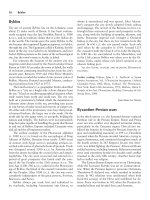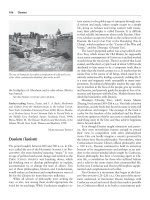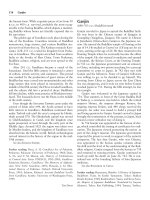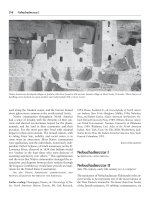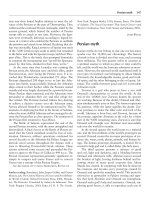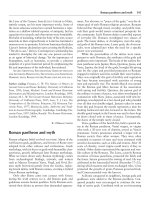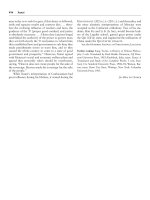Encyclopedia of world history (facts on file library of world history) 7 volume set ( PDFDrive ) 955
Bạn đang xem bản rút gọn của tài liệu. Xem và tải ngay bản đầy đủ của tài liệu tại đây (94.51 KB, 1 trang )
O
Ogotai Khan
(1185–1241) Mongol leader
Ogotai Khan was the third son of Genghis Khan and
spent most of his early life campaigning. Realizing the
implacable enmity between his first and second sons,
Juji and Chagatai Khan, Genghis decided in 1219 to
bypass both for supreme leadership of the Mongols after his own death in favor of Ogotai. He reconfirmed
this decision before his death in 1227. Ogotai was
confirmed as the Mongols’ second khaghan (grand
khan) by the khuriltai of Mongol leaders in 1229 and
established Karakorum on the upper reaches of the
Orkhon River as his capital, surrounding it with a
defensive wall.
True to his martial heritage Ogotai began his
reign with massive campaigns to expand the Mongol
empire, amassing four armies. One marched westward
to conquer the steppelands of central Eurasia and the
Russian principalities, across the Ural Mountains, and
the Volga River. Led by the old warrior Subotai and
Batu (Juji’s son), its goal was to secure and enlarge the
inheritance of the sons of Juji (who had predeceased
Genghis Khan). A second army’s goal was to complete
the conquest of Khwarazm, which includes modern
Iran, then onto the Middle East and Asia Minor. A
third army took on Korea, which had been conquered
earlier but had revolted against the unbearable conditions of Mongol rule. Finally Ogotai and his younger
brother Tului Khan led a force to finish the conquest
of the Jin (Chin) dynasty in northern China. They
took the Jin capital Kaifeng (K’ai-feng) in 1233; the
last Jin emperor committed suicide in 1234 and all
northern China came under Mongol rule. Subotai’s
army had the most spectacular success, conquering the
Turkish tribes of the Russian steppes, all the Russian
principalities except Novgorod, the Ukraine, Poland,
Moravia, and Hungary. They were at the gates of
Vienna before withdrawing in 1241 on the news of
Ogotai’s death. The army sent to conquer the Middle
East added western Persia and the Caucasus to Mongol
control. Korea submitted in 1259. Ogotai also made
administrative reforms to centralize the administration
to ensure his control over the Mongol lords and the efficient gathering of taxes and tribute from his sedentary
subjects. Thanks to a remarkable non-Mongol adviser
Yelu Chucai (Yeh-lu Ch’u-ts’ai) reforms were begun
in northern China that ended the brutal looting and
massacre of the population on the premise that working people paid more taxes than expeditions could
gather.
After the campaign against Jin, Ogotai returned to
Karakorum and abandoned himself to a life of pleasure,
hunting and drinking so heavily that an official was
appointed to count the amount of wine he drank daily.
His second wife, Toregene, moved quickly to consolidate
her authority even before he died while on a hunting trip;
he was buried in Jungaria in his personal appanage (fief).
According to Mongol custom his widow, Toregene,
became regent until the khuriltai elected a new ruler.
Her goal was to ensure the election of her son Guyug
as the next khaghan, despite much opposition by other
313

